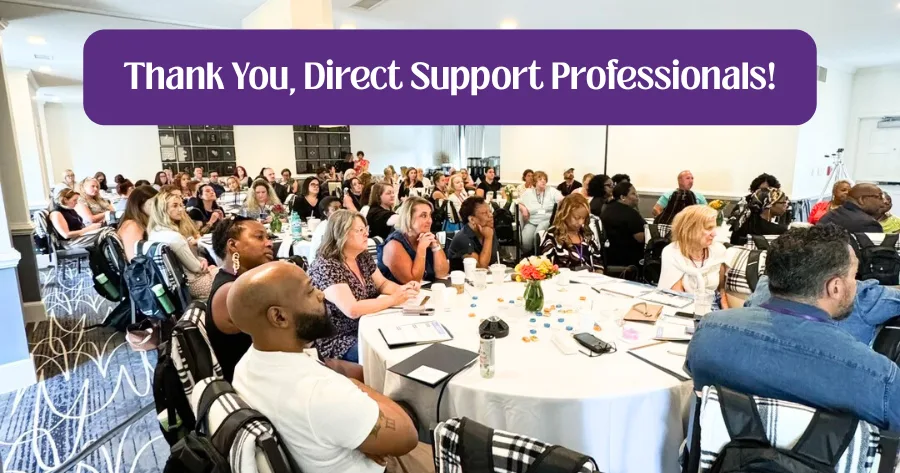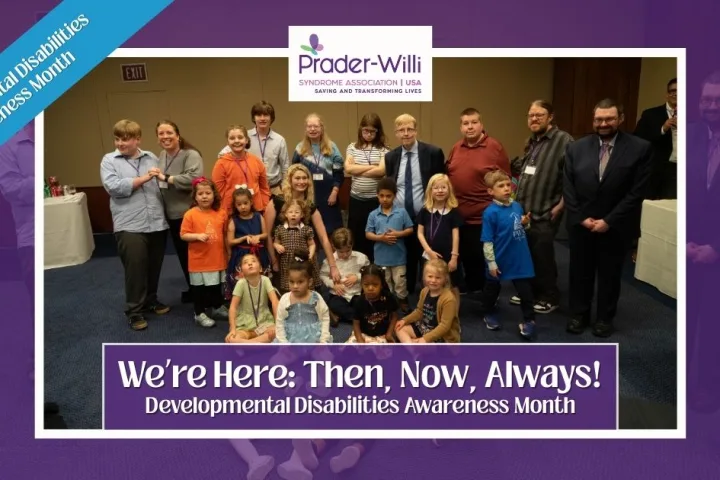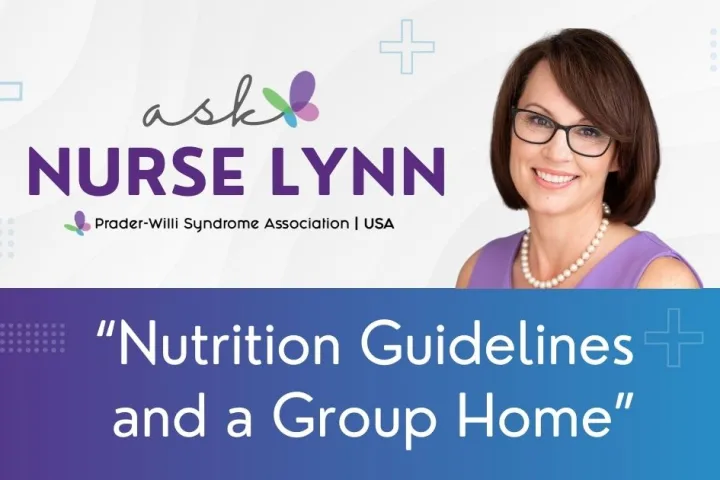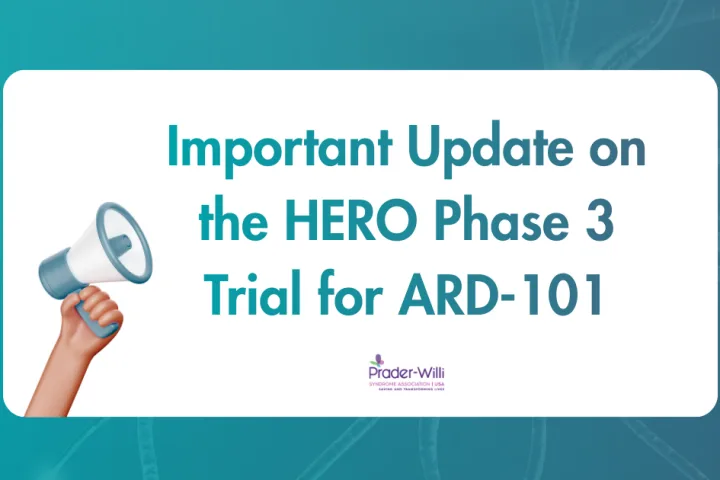National Direct Support Professionals Week is September 11 - 17, 2022. This is a week to recognize and show appreciation for the work of providers who are supporting individuals with developmental and intellectual disabilities to maximize their independence.
Direct Support Professional (DSP) is an umbrella term that includes many different titles and functions, including direct care, direct support worker/specialist/assistant/counselor, habilitation specialist, residential counselor, activities of daily living specialist, relief staff, apartment worker, developmental disabilities specialist, job coach, employment specialist, community bridge-builder, paid friend/neighbor, family care provider, family support services aide, community companion, personal assistant, etc. Regardless of what title they have, they are the backbone of paid supports for individuals diagnosed with intellectual/developmental disabilities.
DSPs play an important role in encouraging and maintaining the health and wellness of individuals living with PWS, while fostering their personal growth, independence, and development of life skills. They wear many hats in their role, such as chauffeur, nurse, therapist, personal care aid, confidante and, in some cases, food security. They help people build relationships and expand their circle of natural support. They provide care and assistance to individuals and often get to know them as well as family members do. They know when they are excited about something, are feeling confident, or when they are having a difficult day and are feeling down. Direct Support Professionals are often the first to recognize when someone is not well, and further assessments are necessary by a health care provider. They then help to share the assessment results in a way that is meaningful and understandable to the individual.
Direct Support Professionals are responsible for the safety, dignity, and health of the individuals they support. They must be “on” at all times, and have an obligation to discover the aspects of the whole individual that aren’t documented in their "chart." They have an obligation to help individuals discover aspects of themselves they may not be aware of. DSPs must be skilled verbal and non-verbal communicators. They communicate with the individuals they support, family members, co-workers, physicians, and clinicians, both verbally and in writing. They also model and practice appropriate communication with the individuals that they support.
Direct support professionals empower individuals to make informed decisions and to communicate them respectfully. They encourage individuals to branch out of their comfort zones and to grow, while providing support and a safety net. They teach individuals that failure, frustration and disappointment are parts of life, and how to learn from those feelings and experiences. DSPs are unsung heroes!
Below are a few tips to recognize and show your appreciation to the Direct Support Professionals in your life.
- Create a two-minute video from both you and your loved one being supported, thanking the DSPs in your life for their support. Share the difference that they are making.
- Post a message on the agency’s social media site recognizing the DSPs for all their efforts.
- Write a heartfelt card to each of the DSPs supporting your loved one – messages of appreciation from family members are powerful.
- Provide lunch or coffee for the team supporting your loved one.
- Provide a gift bag with some of their favorite things.
- Advocacy – get involved in advocating for legislation that would increase pay for DSPs.
- Contact your mayor or governor and request that they issue a proclamation declaring September 11-17th DSP week in your city or state. Encourage the mayor or governor to record a thank-you video that you can share with DSPs.
- Send pictures and messages of appreciation to PWSA | USA to share on social media during DSP week.
Share this!





 Perry A. Zirkel has written more than 1,500 publications on various aspects of school law, with an emphasis on legal issues in special education. He writes a regular column for NAESP’s Principal magazine and NASP’s Communiqué newsletter, and he did so previously for Phi Delta Kappan and Teaching Exceptional Children.
Perry A. Zirkel has written more than 1,500 publications on various aspects of school law, with an emphasis on legal issues in special education. He writes a regular column for NAESP’s Principal magazine and NASP’s Communiqué newsletter, and he did so previously for Phi Delta Kappan and Teaching Exceptional Children. Jennifer Bolander has been serving as a Special Education Specialist for PWSA (USA) since October of 2015. She is a graduate of John Carroll University and lives in Ohio with her husband Brad and daughters Kate (17), and Sophia (13) who was born with PWS.
Jennifer Bolander has been serving as a Special Education Specialist for PWSA (USA) since October of 2015. She is a graduate of John Carroll University and lives in Ohio with her husband Brad and daughters Kate (17), and Sophia (13) who was born with PWS. Dr. Amy McTighe is the PWS Program Manager and Inpatient Teacher at the Center for Prader-Willi Syndrome at the Children’s Institute of Pittsburgh. She graduated from Duquesne University receiving her Bachelor’s and Master’s degree in Education with a focus on elementary education, special education, and language arts.
Dr. Amy McTighe is the PWS Program Manager and Inpatient Teacher at the Center for Prader-Willi Syndrome at the Children’s Institute of Pittsburgh. She graduated from Duquesne University receiving her Bachelor’s and Master’s degree in Education with a focus on elementary education, special education, and language arts. Evan has worked with the Prader-Willi Syndrome Association (USA) since 2007 primarily as a Crisis Intervention and Family Support Counselor. Evans works with parents and schools to foster strong collaborative relationships and appropriate educational environments for students with PWS.
Evan has worked with the Prader-Willi Syndrome Association (USA) since 2007 primarily as a Crisis Intervention and Family Support Counselor. Evans works with parents and schools to foster strong collaborative relationships and appropriate educational environments for students with PWS. Staci Zimmerman works for Prader-Willi Syndrome Association of Colorado as an Individualized Education Program (IEP) consultant. Staci collaborates with the PWS multi-disciplinary clinic at the Children’s Hospital in Denver supporting families and school districts around the United States with their child’s Individual Educational Plan.
Staci Zimmerman works for Prader-Willi Syndrome Association of Colorado as an Individualized Education Program (IEP) consultant. Staci collaborates with the PWS multi-disciplinary clinic at the Children’s Hospital in Denver supporting families and school districts around the United States with their child’s Individual Educational Plan. Founded in 2001, SDLC is a non-profit legal services organization dedicated to protecting and advancing the legal rights of people with disabilities throughout the South. It partners with the Southern Poverty Law Center, Protection and Advocacy (P&A) programs, Legal Services Corporations (LSC) and disability organizations on major, systemic disability rights issues involving the Individuals with Disabilities Education Act (IDEA), Americans with Disabilities Act (ADA), and the federal Medicaid Act. Recently in November 2014, Jim retired.
Founded in 2001, SDLC is a non-profit legal services organization dedicated to protecting and advancing the legal rights of people with disabilities throughout the South. It partners with the Southern Poverty Law Center, Protection and Advocacy (P&A) programs, Legal Services Corporations (LSC) and disability organizations on major, systemic disability rights issues involving the Individuals with Disabilities Education Act (IDEA), Americans with Disabilities Act (ADA), and the federal Medicaid Act. Recently in November 2014, Jim retired.